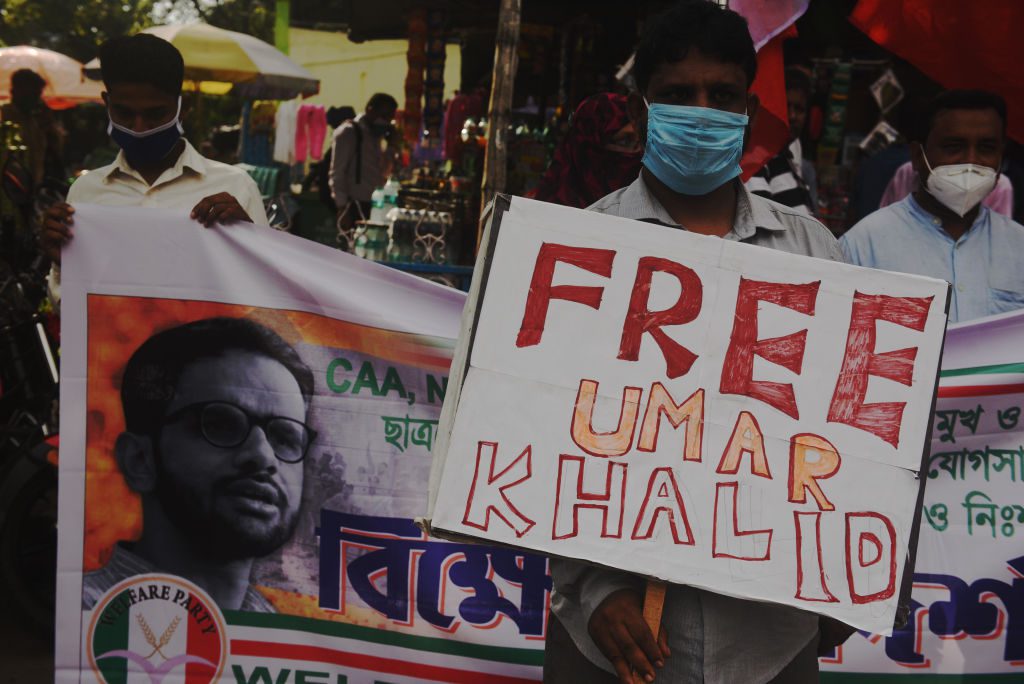As Amnesty International and six other international human rights organizations released a joint statement calling on the Government of India to immediately release human rights defender and student activist Umar Khalid, ahead of the five-year anniversary of his continued unjust detention without trial, Amnesty India’s chair of the board, Aakar Patel said:
“The Government of India must immediately and unconditionally release human rights defender and student activist Umar Khalid who has been incarcerated for five long years without trial on politically motivated charges. Starved of justice, Khalid’s prolonged persecution exemplifies the derailment of justice in India as it makes a mockery of international human rights principles. The repeated bail denials combined with persistent delays, and the continued absence of trial proceedings, amount to a violation of Khalid’s right to a fair and speedy trial, guaranteed under the International Covenant on Civil and Political Rights (ICCPR), to which India is a state party, as well as under the Constitution of India.
“In India, the overbroad Unlawful Activities (Prevention) Act (UAPA) is routinely and selectively used against human rights defenders including journalists, civil society activists and students who remain imprisoned without trial such as Khalid. The application of bail standards in such cases is also discriminatory as similarly situated accused have been granted bail while Khalid continues to be repeatedly denied relief. All this really demonstrates India’s deep fear of human rights defenders like Umar Khalid who dare to dissent.
“Khalid’s detention is not an isolated case and is emblematic of a broader pattern of repression faced by those who dare to exercise their rights to freedom of expression, association and peaceful assembly. Other students and human rights activists, including Gulfisha Fatima, Sharjeel Imam, Khalid Saifi, Shifa-ur-Rehman and Meeran Haider, also remain in detention for their peaceful opposition to CAA, while police officials and political leaders responsible for incitement or complicity in violence that followed the anti-CAA protests in 2020 continue to enjoy impunity. These are clear cases of selective prosecution aimed at criminalizing and chilling dissent in India.”
Starved of justice, Khalid’s prolonged persecution exemplifies the derailment of justice in India as it makes a mockery of international human rights principles.
Aakar Patel, Amnesty India’s chair of the board
Background:
In December 2019, the Government of India introduced CAA, which alongside the proposed National Population Register prompted nationwide peaceful protests. In February 2020, communal violence erupted in the context of the protests, leaving 53 dead – 38 of them Muslims – and hundreds injured. The Delhi Police failed to bring perpetrators to justice. Instead, they arrested peaceful protesters, including at least 18 students and activists, the majority of them Muslims, including Khalid. Authorities accused them of instigating violence and conspiring to defame the Indian government.
Khalid was arrested on 13 September 2020 and subsequently charged under the Indian Penal Code with offences including sedition, murder, promoting enmity between religious groups, unlawful assembly, and rioting amongst others. He was also charged under the UAPA for alleged unlawful and terrorist activities and conspiracy and under the Prevention of Damage to Property Act and the Arms Act.
Over the past five years, his bail applications have been denied at least four times by trial and appellate courts, most recently on 2 September and his petition before the Supreme Court of India was adjourned at least 14 times in eleven months ultimately leading Khalid to withdraw his petition.
On 12 September, a joint statement asking for Umar Khalid’s immediate release was issued by Amnesty International, CIVICUS: World Alliance for Citizen Participation, International Commission of Jurists (ICJ), International Federation for Human Rights (FIDH), Forum Asia, Front Line Defenders, and World Organisation Against Torture (OMCT), within the framework of the Observatory for the Protection of Human Rights Defenders













